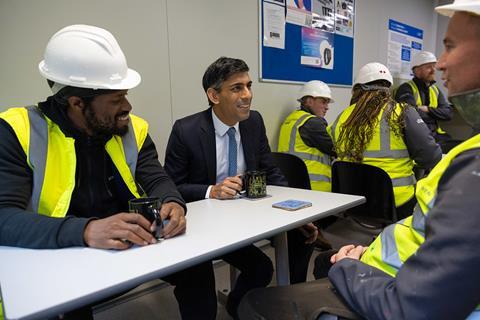Fewer than one in five believe Rishi Sunak’s team can improve market conditions
Almost two-thirds of contractors say the industry cannot influence policymaking on issues affecting the built environment, according to a Gleeds survey which found the sector’s lack of confidence in the government is hampering growth.
Fewer than one in five of those quizzed for the consultant’s latest market report said they had confidence that the current government could improve market conditions and increase output from the construction sector.
Respondents ranked interest rates and inflation as the biggest threats to business, but, with an election year on the horizon, said an incoming government should focus its effort on addressing labour shortages, shrinking the skills gap, incentivising land development and improving payment practices.

>> Read more: IR35 and low immigration could limit UK construction when demand rebounds, says Core Five
>> Read more: Construction returns to growth but housing stays stuck in doldrums
More than 90% of respondents reported that inflation is now heavily impacting the viability of schemes and 95% of contractors said that they had declined a tender in the last quarter – up from 78% in the spring survey.
At least 40% attributed this to lack of capacity, while 52% said tendering conditions were too onerous or that the risk profile was unacceptable.
Gleeds chief executive Graham Harle said, “The market report reflects the fact that the wider economic conditions remain challenging.
“Clearly, the construction industry does not have faith that the current government is listening, so it seems that we must act to strengthen the sector from within.
“Embracing digital technologies will help us to boost productivity and may enable us to attract a more diverse workforce, while increasing collaboration and forging knowledge transfer partnerships will allow us to deliver even greater efficiencies despite depleted resource.”



























No comments yet